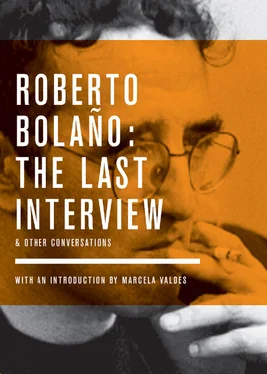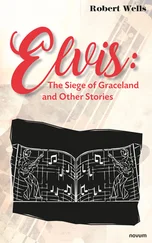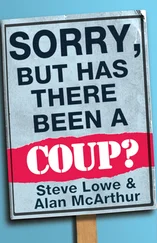In the final section of 2666 , “The Part About Archimboldi,” Bolaño presents a more sinister vision of evil. The section opens at the end of World War I, with a wounded Prussian’s return home. Everything is changing, a stranger tells him: “The war was coming to an end and a new era was about to begin. [The Prussian] answered, as he ate, that nothing would ever change.” Indeed, the whole finale of 2666 , which spans the First World War to the late 1990s, seems designed to prove Archimboldi’s belief that history is nothing more than a series of instants “that vie with one another in monstrousness.” As Archimboldi fights for the Third Reich on the Eastern Front and starts his career as a novelist in the ruins of Berlin, Bolaño regales us with tale after tale of rape and murder. In the hills of Germany, a man kills his wife and the authorities turn a blind eye. During the war, city folk who flee to the country are routinely robbed, raped and killed. The land around a Romanian castle is filled with buried human bones, and allusions to the Holocaust abound.
In this landscape of brutality and impunity, Santa Teresa seems less aberrant. It’s just one of many places where an underlying, pervasive evil has welled up and broken the surface. As it is now in Santa Teresa, the novel seems to say, as it has always been, as it shall be in the cemeteries of 2666. Evil is as widespread and eternal as the sea.
This vision of violence brings to mind America’s own apocalyptic writer, Cormac McCarthy, but Bolaño’s novel has more sex and comedy, and his hero is quite different from those in The Road or Blood Meridian . Archimboldi marches through the battlefields of Poland and Romania like a man trolling along the bottom of the sea, immersed in the deep’s dark horror yet untouched by it. As a teenager, he reads Wolfram von Eschenbach’s Parzival and is captivated by the idea of a “lay and independent” medieval knight. His own holy grail turns out to be a dead man’s diary he discovers in an abandoned shtetl.
A lay and independent knight: these words could describe both the great detectives and the great writers who wander through the pages of 2666 . All of them are loners who devote themselves to reading and swimming in the abyss. Being a writer in this world is as dangerous as being a detective, walking through a graveyard, looking at ghosts.
I. “LITERATURE IS NOT MADE FROM WORDS ALONE”. INTERVIEW BY HÉCTOR SOTO AND MATÍAS BRAVO
FIRST PUBLISHED IN CAPITAL, SANTIAGO, DECEMBER 1999
HÉCTOR SOTO AND MATÍAS BRAVO:What is your relationship with writers from the Latin American Boom?
ROBERTO BOLAÑO:Good, very good — as a reader, of course. Anyway the Boom is an imprecise notion. It depends on what parameters everybody gives. Does Sábatocome in or not? How about Onetti?Most people would say no. Rulfo, who for me is one of the cornerstones of the Boom, is also left out.
Argentine writer, Ernesto Sábato (b. 1911) was a driving force in the Argentine surrealist scene. Much of his work is available in English.
Uraguayan novelist and short story writer Juan Carlos Onetti (1909–1994) sought to blend the real and the fantastic in his fiction. His novella The Pit (1939) is one of the first works of modern Spanish-language literature.
After publishing the short story collection The Burning Plain (1953) and the novel Pedro Párama (1955), Mexican author Juan Rulfo (1917–1986) stopped publishing narrative fiction, despite the enormous critical success of his books. Both Faulkner and García Márquez were influenced by Rulfo’s prose.
Born in Honduras, raised in Guatemala, and eventually exiled to Mexico, Augusto Monterroso (1921–2003) was a deeply respected short story writer. His story “The Dinosaur” is said to be literature’s shortest story. In full, it reads: “When he woke up, the dinosaur was still there.” His Complete Works and Other Stories (1995) is available in English.
HS/MB:Perhaps the emblematic figures of the movement were too adored, an injustice for quieter figures like Monterroso and Onetti, who are vindicated more and more. They’ve stayed relevant with the passage of time.
RB:I don’t believe so. The literature of Vargas Llosa or García Márquez is gigantic.
HS/MB:A cathedral.
RB:More than a cathedral. I do not think time will harm them. The work of Vargas Llosa, for example, is immense. It has thousands of entry points and thousands of exit points. So does the literature of García Márquez. They’re both public figures. They’re not just literary figures. Vargas Llosa was a candidate for president. García Márquez is a political heavyweight and very influential in Latin America. This distorts things a bit, but it shouldn’t make us lose sight of the position they have in the hierarchy. They are superiors, superior to the people who came after and, to be sure, to the writers of my generation. Books such as No One Writes to the Colonel are simply perfect.
No One Writes to the Colonel is a García Márquez novella.
HS/MB:Since you read the Boom during its own time, your reading must have been from the perspective of a poet. During that period, you were only writing poetry.
RB:Yes, but I read plenty of narrative work, although it’s clear that my readings were from the perspective of a poet, which is a shame in a sense. If my reading had been from a narrator’s perspective, I would have probably learned more. Perhaps I have gaps in the way I look at the internal structures of a novel. I would have learned this sooner had I read with a different perspective.
HS/MB:I have the impression that you compose small plots, which you then fit into the overall novel, although it isn’t so clear whether you do it with a preconceived idea of what the work will eventually be.
RB:I always have an idea. Each time I begin to write a novel, I have a very elaborate structure in mind.
HS/MB:Very elaborate, yes. But it does not prevent each of your phrases, given the rhythm and inflection you infuse them with, from being justified, though not always in the service of the novel’s unfolding plot.
RB:Well, I think that’s something else. It relates to the elemental debt all prose writers have, which consists of cleaning a bit, trying to get close to language with open eyes and ears. I appreciate your words very much, but I don’t assign great relevance to hygienic definitions of my work. I’m very demanding in that sense. Without going any further than Savage Detectives , there are phrases and whole paragraphs in it that seem to me to be very bad. They seem terrible to me.
HS/MB:Your books are distinct approximations of a particular world, a world of writers and rather marginal people who are in between being obsessives and losers. Your stories and novels also center around the same situations or the same characters.
RB:Also around the same arguments.
HS/MB:Exactly. Your characters are crusaders for revolutionizing art and changing the world, which is the project of your generation.
RB:Revolutionizing art and changing life were the objectives of Rimbaud’s project. And reinventing love. At heart, to make life a work of art.
HS/MB:But you are a part of the world that you describe, and you look affectionately toward it.
RB:Perhaps I’ve been attempting to forgive myself.
Читать дальше












